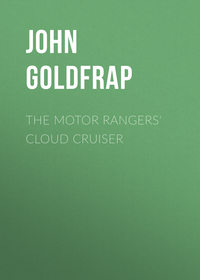 полная версия
полная версияThe Boy Aviators' Flight for a Fortune
There was some spare rope on board the hulk, and with this Harry made the fastenings of the launch more secure, leading one end of the rope on board the schooner itself, and making it fast to a cleat. He felt that the craft would be more safe if attached thus than would have been the case had he depended on the gangway alone.
This done, he took a look about him. He had had a vague hope that he might sight a ship of some sort, but the ocean was empty as a desert. Not a sail or a smudge of smoke marred the horizon. All this time the wind had been steadily freshening, and Harry judged that the schooner must be drifting before it quite fast. The inclined superstructure naturally added to her “windage” and made her go before the gale more rapidly. The sea, too, was piling up in great, glistening, green water rows, which looked formidable indeed. But so far the Betsy Jane had wallowed along right gallantly, only shipping a shower of spray occasionally when a big sea struck her obliquely on the bow.
“If only I had plenty of food and water,” thought Harry, “this would be nothing more than a good bit of adventure, but – ”
In accordance with his resolution not to dwell on the more serious aspects of his predicament he dismissed this side of the case from his mind. But as the day wore on, and he grew intolerably thirsty, the thought of what might be his fate, if he did not fall in with some vessel, beset his mind more and more, to the exclusion of all else. In the afternoon, as closely as he could judge the time, he took another drink from the fast-diminishing supply in the keg. He noticed, with an unpleasant shock, that the fluid was growing alarmingly lower. Before he took the draught he had cleaned up the remaining crumbs left in the locker, and was now absolutely without food.
The rest of that afternoon he passed watching the empty sea for some sign of a ship, but not a trace of one could he discover. Utterly disheartened he watched the sun set in a blaze of crimson and gold. The sunset lay behind him, and Harry knew by this that he was drifting east at a rapid rate. Just how rapid he had, of course, no means of calculating. Of one thing he was thankful – the sea had not increased, and the wind appeared to have fallen considerably with the departure of daylight.
“Surely,” thought the boy, “I must have drifted on the track of ocean vessels by this time. I know there’s a line to Halifax, and another to Portland, besides the coasters.”
With this thought came another. What if he should be run down during the night? The idea sent a shudder through his scantily clothed form. He knew that derelicts are often the cause of marine disasters, and during the dark hours the hulk might invite such a fate if he did not take steps to guard against it.
Accordingly he lit his lantern and hung it in the underpinning of the inclined superstructure.
“At least they can see that,” he thought, as he completed the hanging of his warning light.
Then, having done all he well could under the circumstances, Harry cast himself down in the lee of the weather bulwarks and tried to sleep. But in his scanty attire he was far too cold to do aught but lie and shiver till his teeth chattered. He determined to pass the rest of the night below, and once more sought a couch in the empty bunk. But sleep was a long time coming. Tired, excited and hungry as the boy was, he could not compose himself to slumber. Ten or a dozen times he started up and ran to the deck, thinking that he had heard the distant beat of some vessel’s engines. But each time it proved a false alarm.
At length tired nature asserted herself, and he sank to sleep in good earnest. When he awakened it was daylight, and there was an odd feeling about the motion of the Betsy Jane. She seemed to have ceased her rolling and pitching, and was almost steady in the water. Suddenly there came a jarring crash that almost threw Harry out of the bunk.
Much startled, he ran on deck, and found, to his astonishment, that the vessel lay right off an island. Seemingly she had grounded on a reef of rocks stretching out from the island itself. At any rate, as the waves rocked her she gave a jarring, crunching bump with each pitch of her hull. The island appeared to be a small one, and in general appearance was not unlike Brig Island. In fact, at first Harry had thought that in some magical way the Betsy Jane had drifted back to that small speck of land. But a second glance showed him that the island off which the dismantled hull had grounded differed in many essentials from the one he had left. Far to the westward, about twenty miles as well as the boy could judge, lay a dim streak of dark blue that Harry guessed was the mainland. But for all the good it did him it might have been a hundred miles removed.
Harry was still gazing at the island and wondering how he could reach it before the Betsy Jane pounded herself to pieces on the rocks, when he started violently. The island was not, as he had supposed, uninhabited – at least, he had caught sight of a swirl of blue smoke rising from among the trees on its highest part. This meant help, companionship and food. An involuntary cry of joy rose to the boy’s lips, which the next instant turned to a groan as he looked over the side of the schooner and saw that the reef on which she had struck was much too far out from the shore for him to try to swim the distance, even if a roaring, racing tide would not have made it suicidal to attempt the feat.
“Unless I can attract the attention of whoever lives there by shouting, I’m as badly off as I was before,” exclaimed Harry, in a voice made quavery by panic.
CHAPTER VI. – HARRY MEETS AN OLD FRIEND
All at once, while he was still gazing at the column of smoke shoreward, Harry became aware of a figure coming out of the woods toward the beach. He shouted with all his might, and the man who had appeared from the undergrowth waved a reply.
Then his voice came over the water.
“What’s up?”
The tone somehow was strangely familiar to Harry, and, for that matter, when he had first seen the figure of the newcomer it had struck him with an odd sense of familiarity. Suddenly he realized why this was.
“Ben Stubbs!” he yelled at the top of his lungs.
“Ahoy, mate!” came back after a pause; “who are you?”
“Harry Chester!”
“By the great horn spoon! What the dickens are you doing out there?”
Cupping his hands to make his voice carry the better, Harry hailed back once more.
“I drifted here on this hulk. Can you take me off?”
“Can I? Wait a jiffy.”
Ben Stubbs – for it was actually the “maroon” whom the boys had rescued from a miserable fate in the Nicaraguan treasure valley – began running along the shore as fast as his short legs would carry him. Presently he vanished around a wooded promontory, leaving Harry in a strange jumble of feelings. What could the good-hearted old companion of several of their adventures be doing on this desolate island off the Maine coast? When they had last heard from him he had been running a tug boat line in New York harbor, having purchased the business with the profits made out of the discovery of the treasure trove in the Sargasso Sea.
Before a great while the man who had so opportunely appeared came into view once more This time he was in a skiff, rowing with strong strokes toward the stranded hulk of the Betsy Jane. Harry watched him with eager eyes. Fast as Ben Stubbs rowed, it seemed an eternity to the anxious boy before his strangely rediscovered friend reached the side of the grounded schooner.
When he did so he hastily made fast, and was up the gangway ladder three steps at a time. Fortunately for his haste, the sea had diminished in roughness considerably, and the Betsy Jane lay almost motionless on the reef. Otherwise he would have stood a strong chance of being thrown from his footing. Harry was at the gangway as Ben Stubbs’ weather-beaten countenance came into view at the top of the steps.
Ben seized the boy’s hand in a grip that made Harry flinch, but he returned it with as strong a clench as he could. For a moment both of them were too much overcome with emotion at the strange meeting to utter a word. It was Ben who spoke first.
“Waal, what under the revolving universe are you doing here?” he demanded.
“I was about to ask the same question of you.”
“It’s a long story, boy, and you look just about played out. What has happened? I never dreamed that you were even in this neighborhood.”
“I guess the same thing applies to me, so far as you are concerned, Ben,” rejoined Harry, between a laugh and a sob. “As for myself, I’ve been adrift all night on this old hulk. Some rascals cut her loose from her moorings at Brig Island.”
“Wow! you’ve drifted all the way from there. Why, it’s fifty miles or more away.”
“I know it. It seemed a million to me. What worries me is what the others must be thinking. They won’t know if I’m dead or alive.”
“We’ll find a way to let ’em know, never fear,” struck in Ben in his deep, rumbling voice; “but I reckon you’re hungry and thirsty?”
“Am I? Why, I could eat a horse without sauce or salt, as you used to say.”
“Then get in the skiff and come ashore. I’ve got a sort of a hut there. It ain’t much of a place, but I’ve got enough to eat and a good spring of clear water, and I can give you a suit of slops.”
“But the schooner?” demanded Harry.
“She’ll be all right, I reckon. She’s lying on a sort of sandy ridge that runs out here. The sea’s gone down so that she won’t do herself any harm, and we can’t do her any good right now. You see, the tide is falling. When it rises we’ll try to get her off and anchor her in a snugger berth.”
Harry might have argued the point, but the prospect of food and drink made so strong an appeal to him that he did not stop to waste words. Five minutes later they were rowing ashore, and, while Ben bent to the oars with a will, Harry told him in detail all that happened since they came to Brig Island, and the reason of their presence there. He knew that he was safe in confiding in old Ben.
The relation of his story occupied the entire trip to the shore, and when Ben had beached his skiff he seized Harry by the arm and began hurrying him up the beach toward a small hut, half canvas, half lumber, which stood back under the shelter of a low bluff. The boy was desperately anxious to learn the reason of Ben’s presence on the island, for he knew it could have no ordinary cause. But the weather-beaten old adventurer would not allow the boy to say another word till he had clothed himself and eaten all he could put away of a rabbit stew washed down with strong coffee.
“Now, then,” remarked Ben, as soon as Harry had finished, “I suppose you’re a-dyin’ to hear what I’m doin’ on Barren Island, which is the name of this bit of land?”
“I am, indeed,” declared Harry, shoving back the cracker box which had served him as a chair; “the last person in the world I would have expected to see when the Betsy Jane grounded was Ben Stubbs.”
Ben chuckled.
“Allers turnin’ up, like a bad penny, ain’t I?” he said, shoving some very black tobacco into his old pipe. “’Member ther time I dropped out of the sky in thet dirigible balloon?”
“Well, I should say I did,” laughed Harry; “but how you got here is past my comprehension. What became of the tug boat line?”
Ben snapped his fingers.
“All gone, my lad! Gone just like that! I reckon I’m not a good hand at business, or the crooked tricks that answers for that same. Anyhow, to make a long yarn a short one, I went on a friend’s note and he dug out. That was blow number one. To meet that note I had to mortgage some of my boats, and in some way – blow me if I rightly understand it yet – I got myself in a hole whar’ the lawyer fellers bled me till I was mighty near dry. I tried to struggle along, but it wasn’t no go. Then came a strike of tug boat hands and that finished me. I couldn’t stand the long lay off without anything to do, so I sold out for what I could get, and – and here I am.”
“I’m mighty sorry to hear that you failed, Ben,” said Harry with real sympathy in his tones, “but you haven’t said yet what you are doing here on Barren Island, as you call it.”
“I’m a-gettin’ to that, lad,” said Ben, emitting a cloud of blue smoke; “give me time. As I told you, that feller on whose note I went, skedaddled. You see, I’d trusted him as my own brother, bein’ as I knew his father when I was a miner. He – that’s this chap’s father, I mean – was a Frenchman, Raoul Duval was his name, and his son’s name the same. Old man Duval made his pile in Lower Californy and was makin’ fer his home in New Orleans when ther steamer he was travelin’ on blew up, and he and all his gold dust – a whalin’ big lot of it – went to the bottom.
“I never calculated to hear anything more of Duval arter this, but one day this young feller I’ve been tellin’ you about shows up in New York and hunts me up. He tells me that he’s old Raoul’s son, and that he’d had a run of hard luck and so on, and wants to go into business, and if, for his father’s sake, I’ll help him out. I asks him how he found me out, and he says that in his father’s letters home I had often been mentioned, and that when he heard of the Stubbs Towing Line he made inquiries and found that I was in all probability the same man.
“As I told you, I let him have the money. It don’t matter just how much, but it was quite a bit. You see, I did it for the old man’s sake. I was sorry afterward. Young Duval wasn’t a chip of the old block at all. He was idle and dissipated. His business went under and he skipped out.”
“Did you lend him this money without security of any sort?” asked Harry incredulously.
“In a way, yes. In another way, no. The young chap, when he came to me, had a wild story about knowing where the steamer on which his dad lost his life had sunk. He said that from letters written home before he left Lower Californy, he knew the old man was carrying with him, besides the dust, a fortune in black pearls. Of course, all these went down when the steamer blew up. He had tried, he said, to get a lot of folks interested in a scheme to get at the wreck and recover the dust and the pearls, but they had all laughed at him. He said if I’d give him the money he wanted he’d give me, in return, the plan of the location whar’ the steamer went down.”
“And did he?”
“Yes; but since he acted as he did I guess there’s no more truth in his yarn than there was in anything else he told me. Anyhow, I’ve never bothered my head about the matter since.”
“Have you got the plan?”
“Sure enough,” Ben fumbled in his pocket, “here it is; it’s a roughly drawn thing, as you see, but I reckon if the ship was really there it would be an easy matter to locate her bones.”
Harry nodded. He was looking over the map with deep attention. It was, as Ben had said, a crudely drawn affair, and purported to have been sketched by one of the survivors of the wreck, who, of course, did not know that in the returning miner’s cabin there was so much wealth.
“How did young Duval get hold of this?” he asked at last.
“He said that by chance he met a man who was the lone survivor of the disaster. This feller didn’t know who Duval was, and began talking to him about the wreck. Duval, recollecting that his father had carried a sum that amounted to more than $75,000, was naturally interested. He asked the man if he could draw him a sketch of the scene where the steamer sank. The feller said he could, and that thar sketch is what he drawed. At least that’s Duval’s story, and I’m frank to tell you I don’t believe a word of it.”
“But still you haven’t told me what you are doing on this island,” said Harry after an interval.
“That’s so, too, lad. I got so interested in tellin’ my troubles I clean forgot about Barren Island. Well, it’s this way. Arter the crash I felt ashamed to show my face. Oh, all the creditors were paid up – every last one of ’em. But I felt like I was an old failure, and good fer nuthin’, so I remembered all of a sudden about this island that I’d been stranded on a good many years ago. I made inquiries and found that I could live here rent free as long as I liked, with none to interfere, and so I came here. It’s quiet and might be lonesome to some folks, but it suits me well enough, and I was calculatin’ to spend the rest of my days here, till you came along. But I feel different now.”
“How’s that?” asked Harry, not knowing well just what to say to the old man who took his business failure so much to heart.
“Why, I was watching you studyin’ that map. I could see by yer face that you put some stock in Duval’s yarn. Ain’t that so?”
Harry could not but confess that it was. The old man’s story, and the map, had aroused in him the strong desire for adventure that both Boy Aviators possessed to a marked degree. Of course, from what Ben had said, Duval did not appear to be a person on whom much reliance could be placed, but then, again, there was the map, and it at least, even if crude, appeared to have been a genuine effort to mark the spot where the wreck lay. It showed a bayou marked “Black Bayou,” running back from the main stream of the Mississippi. A black dot some distance up this bayou was lettered “Belle of New Orleans,” presumably the name of the steamer on which Duval met his end.
The boy was still pondering over the map when, from seaward, there came a sound that made both Harry Chester and Ben Stubbs spring to their feet.
“It’s a gun!” shouted the old man, as the booming echoes died away; “may be a ship in distress.”
“Hardly, in this weather,” rejoined Harry, in a perplexed tone.
But Ben Stubbs had darted from the shanty and was running for the beached skiff. A minute later Harry was close on his heels, and presently they were pulling around the point, about to run into the surprise of their lives.
CHAPTER VII. – A PUZZLING PROBLEM
It is now time that we returned to the island where we left Pudge Perkins patrolling the beach, and Frank Chester and Billy Barnes wrapped in slumber. Frank had set the alarm clock for midnight, when it had been arranged that he and Billy were to turn out on patrol, and its insistent clamor had only just commenced when he sprang out of his bunk broad awake and prepared to go on duty. Billy stretched and yawned a bit before he, too, tumbled out.
“Gee whillakers!” he exclaimed, as he got into his clothes, “it seems to me that we are making a lot of fuss over nothing, Frank. I don’t believe those fellows will come near the island to-night.”
“Perhaps not; but it’s our duty to be on guard. If anything happened to Dr. Perkins’ invention now it would be almost impossible to repair it in time for the tests he wants to make.”
Talking thus the two lads got into their clothes, drank some coffee, which Frank had prepared while they were dressing, and then set out into the night. They made for the cove from which Harry had started his eventful swim.
“Best wait here till they come round,” said Frank, and he and Billy found places in the sand and made themselves as comfortable as possible till they should hear the footsteps of one of the young sentries. They had not long to wait. Hardly fifteen minutes had elapsed before Frank’s sharp ears caught the sound of some one approaching. A minute later Pudge joined them. His first words were not calculated to make the newcomers feel at ease.
“Where’s Harry?” he demanded.
“Don’t you know?” ejaculated Frank with considerable surprise.
“No. I’ve been making my patrol regularly, and the last three times I’ve been round I haven’t met him.”
Frank’s face could only be dimly seen in the darkness, but all his alarm was plain enough in his next words.
“What can have become of him?”
“Maybe he took the dinghy and decided to look over the motor boat and the hulk,” suggested Billy.
“That’s easy enough to find out,” declared Frank, starting for the place where the dinghy had been beached. A moment later he stumbled over the anchor and, closely following this, by the aid of a lighted match, he made the discovery that the rope had been slashed.
“Harry never took that dinghy,” he exclaimed apprehensively, “there’s been some crooked work here.”
“Thunder and turtles! What do you mean?” gasped Pudge, fully as anxiously.
“That some one has landed here and stolen the dinghy and taken Harry along with them. I can’t think of any other explanation. Harry would never have cut that rope.”
“You mean he’s been carried off?” The question came from Billy Barnes.
“I can’t think of any other explanation. Pudge, did you hear anything that sounded suspicious?”
“Oilskins and onions, no! Not a sound. Let’s fire a pistol and see if we get any answer.”
“That’s a good idea, Pudge – Great Scott!”
“What’s the matter?” demanded Billy Barnes, as Frank broke off short and uttered the above exclamation.
“Look here! Harry’s clothes! Wait till I get a light. There! Now, see all his outer garments and his pistol lying by them.”
“Gatling guns and grass hoppers, if this doesn’t beat all.”
“He can’t have been carried off, then,” burst out Billy, “but if he wasn’t, how did that dinghy rope come to be cut?”
Frank made no answer at the moment. The discovery of Harry’s clothes on the beach had put a dreadful fear into his mind. What if the boy had heard a disturbance on the hulk or on the motor boat and, having swum off to see what was the trouble, had been seized with a cramp and drowned?
But Frank firmly thrust the question from him the next minute. Such thoughts were by far too unnerving to be dwelt on. The others remained silent. They seemed to be waiting for Frank to speak. Presently the words came.
“It’s too dark to see anything out there,” said the boy, in as firm a voice as he could command. “Let’s fire three shots – the signal we agreed upon – and then if Harry is on the hulk or the motor boat he will be sure to answer them.”
The others agreed that this seemed about the best thing to do, and Pudge, taking Harry’s discarded weapon, fired it three times. Then came a long pause, filled with an ominous silence.
“Try again,” said Frank in a strained voice. Once more three sharp reports sounded. But again there was no answer.
“That settles it,” declared Frank solemnly; “something has happened to Harry. We must get out to the hulk and to the motor boat.”
“How? The dinghy’s gone, and – ”
“I’m going to swim for it.”
Already Frank had thrown off his outer garments. On the beach lay a balk of timber which they sometimes used to tie the dinghy to. Frank now ordered his companions to help in rolling this down to the water.
“I’m going to use it as a help in swimming out there,” he said; “the water’s pretty cold, and I don’t want to risk a cramp.”
“Wait till daylight, Frank,” urged Billy; “it won’t be long till dawn now, and – ”
But Frank cut him short abruptly.
“My brother’s out there somewhere,” he said in a sharp, decisive voice, “and I’m going to find out what’s happened to him.”
A minute later Frank was in the water pushing the balk of timber before him and heading, as nearly as he knew how, for the spot where the hulk and the motor boat had been moored.
It was more than half an hour before Billy and Pudge saw him again. Then he reappeared, chilled through and shivering in every limb. His first words almost deprived his companions of breath.
“They’re gone!” he exclaimed.
“What!” the exclamation came from both Billy and Pudge simultaneously. They guessed by some sort of intuition what Frank referred to.
“Yes, they’re both gone,” repeated Frank; “the Betsy Jane and the motor boat.”
“Are you sure you’re not mistaken, Frank?” inquired Billy, unwilling to believe the extent of the catastrophe that had overtaken them.
“I’m as sure that they’re gone as I am that I am standing here,” was the reply. “I cruised about on my log for quite a radius, and couldn’t discover a sign of them. I found the motor boat’s buoy, though. She had been untied by some one.”
“But the Betsy Jane? Schooners and succotash! The Betsy Jane!” broke in Pudge.
“Gone, too,” Frank’s voice broke, “but I wouldn’t care about either if I only knew what had become of Harry.”
“Come on up to the hut and we’ll have some hot coffee and talk it over,” said Billy, who saw that Frank, besides being almost numb with cold, was half crazy at the mystery of Harry’s fate.









